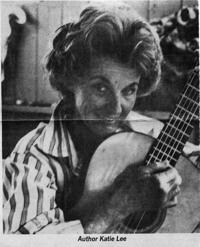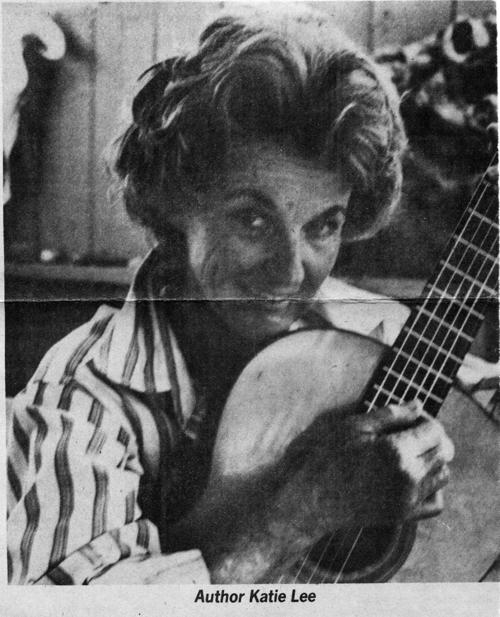Folk singer Katie Lee was born in Tucson Oct. 23, 1919, went to and graduated from the University of Arizona and even wrote a book. She was later an environmental activist.
As with many famous people, articles about her tended to contradict each other a little — even spelling her name differently — but stories change in the retelling. Here are two, one written from an interview and one years later written by a long-time friend.
From the Arizona Daily Star, Sept. 24, 1959:
Tucson Folk Singer . . .
Katy Lee Knows For Sure Life Begins At Forty
By BARBARA SEARS
Hiding her age may be a woman's prerogative, but folk songstress Katy Lee is one vivacious young person who doesn't mind admitting to anyone that she's 40 . . . probably because she doesn't look it.
As a matter of fact, Katy, in private life Mrs. Gene Bush of Holmdel, N. J., takes great pride in the fact that she didn't really get started on her show business career until she was 30. Fascinated by folk songs from the time she was an undergraduate at the University of Arizona, she determined to earn her living by singing them just about 10 years ago, at what her friends assured her was far too advanced an age to break into so competitive a field.
Visiting this week at the home of her mother, Mrs. Basil Vosack, 425 S. Harrison Rd., Katie chuckles when she recalls the discouraging advice she got and insists it is probably one reason for her success. She had to prove herself. "I guess I've always been a fighter," she admits.
Determination and talent have brought her considerable success as a recording artist and night club entertainer. A recent enthusiasm on the part of the American public for authentic folk songs of the west just now means she will have an opportunity next month to record commercially some of the ballads which are still her first musical love. (See Robert Moore's Record Turntable next Sunday in the Star.)
Her short vacation with her husband, also a UA alumnus, seems to her to dramatize the reason western songs are suddenly so big in popular music. With each trip back to Tucson she is aware, she says, of an increasingly rapid movement away from the frontier feeling people have always associated with this part of the country. As the west becomes more and more populous and urban, Americans from every corner of the United States are clinging tightly to all the remaining traces of "real cowboys."
"Why," she marvels, "the other day I heard a record on a juke box of Little Joe the Wrangler, sung straight, all 19 verses. That would never have happened 10 years ago."
Becomingly tanned after running the Colorado River through the Grand Canyon (Katie's 14th trip down the famous rapids), Mr. and Mrs. Bush are on their way back to New Jersey where he is in the process of starting a new business, the manufacturing of a closet-sized complete bathroom with all the necessary equipment contained in retractable units inside the shower. He claims it can be installed simply by connecting it to a water supply and sewer pipe at a cost of about a third the price of any other complete bathroom.
Katie, in addition to recording commitments, has a number of interesting engagements coming up . . . Chicago, Toronto and a return to her long time chanting ground in New York, Downstairs at the Upstairs.
The last is her idea of perfection in night clubs, beautifully planned to let a singer sing to her audience, small and friendly.
"My kind of singing is not for big crowds," says Katie, "you have to be close to the people you're singing to. It's just a freak break for a true folk singers like Harry Belafonte to get mass popularity. He's known how to make the most of his big chance. I'll probably go on singing to small numbers of people who really appreciate what I do. Why not? I love it.
"Every evening during the season I drive into the city in my Thunderbird, do two or three shows at the club. About 2 a.m. I drive home again. Beautiful drive. No traffic. And during the day I lead a country life. Hobby: collecting and refinishing antiques. I love it."
She looks happy, too.
Lee moved back to Arizona eventually, but not to Tucson. She met an old friend for lunch in Tucson to talk about her book, due to be published soon. The friend, Nancy Sortore, just happened to write for the Star, so a little remembrance could not have been a surprise.
From the Arizona Daily Star, Nov. 30, 1975 (no headline was on the column):
I've know Katie Lee, singer, environmentalist, and soon-to-be published author, for more years than either of us likes to count. I've never been able to decide if she is a spoiled brat or a genius.
A recent luncheon, plus an evening spent in her company, has led me to conclude that a combination of the two is most likely.
Since I first met her, when she was about 18, she has always been the center of a small maelstroms; talented, hard working, contentious, she can charm with her songs, or irritate with her abrasiveness.
Tucson used to be her hometown, and she was back recently from Jerome to plug her new record, "Love's Little Sisters" which she cut under the Katydid label.
Katie has pretty much did, or didn't, as Katie pleased, all her life. She has ruffled the feathers of everyone from university officials when she was a student, to Arizona politicians. She shareds some characteristics with Mary-Forge in William Eastlake's "Dancers in the Scalp House." It isn't impossible. He knows Katie.
Katie has never taken pot-shots at hunters in aircraft shooting down eagles, but it's the type of thing that would cross her mind. She would probably hit what she was aiming at, too, as during World War II when meat was scarce, she shot quail with a .22 for the family dinner table.
Katie moved to Jerome in 1970, found a house she could get clear title to, and bought it. She can see for miles, and says the house is bolted down to bedrock.
Besides writing, and making records, she does two or three concerts tours a year, and lectures to theater and sociology classes at carious universities.
Katie, who was then Kay, went to Hollywood when she was 16, returned to Tucson in 1938 and enrolled at the University of Arizona. She almost got herself kicked out of school, as she lived in her own apartment off campus. Freshmen weren't supposed to do that. She financed her education by singing at the Pioneer Hotel with Clancey Wallard's band.
After she graduated from the UA she returned to Hollywood for seven years where she did movies, television and radio shows. In 1954, on money loaned to her by Burl Ives, she went to Chicago where she sang at the Steamliner, Mr. Kelly's and the Gate of Horn and then to New York and the Blue Angel. It was in the 50s that she became interested in folk music and began collecting the cowboy and river songs, and writing some of her own.
Sick of the city nightclub scene, she went to Aspen to the ski nightclubs, but recalls that skiers were so thankful to be alive, they talked incessantly about their narrow escaped and she had to sing over the din.
Then to Sedona, which she fled because "they were plowing that under" and on to Jerome where she still lives.
She was in town last week and we had lunch. She was jubilant that a book she spent 16 years writing is being published by Northland Press in Flagstaff. Included in their spring catalogue, it will be available in the fall.
The book, which she says is "anything but a book about music" contains the stories of the ethnic music of the cowboys, their lives, and the music they made themselves. Knowing Katie, what else could it be titled but "10,000 Goddam Cattle?"
But back to the album. It's nothing you would play to your Baptist aunt whom you hope will leave you her money, but it's a classic of its kind, and it's Katie's tribute to "the women who made the men who made the West." It will, I'm sure, be a collector's item. So far, local stores aren't stocking it, but $7 to Katie Lee, [address deleted] will get a postpaid album.
It was nice seeing you, old friend, and one of these days I'll make it to Jerome, sit on your back porch and look at all that beautiful country. Maybe you'll get out your guitar and sing "That Muddy Muddy River" for me again.
The Morgue Lady can't help but wonder if that ever happened. Katie Lee still lives in Jerome.





